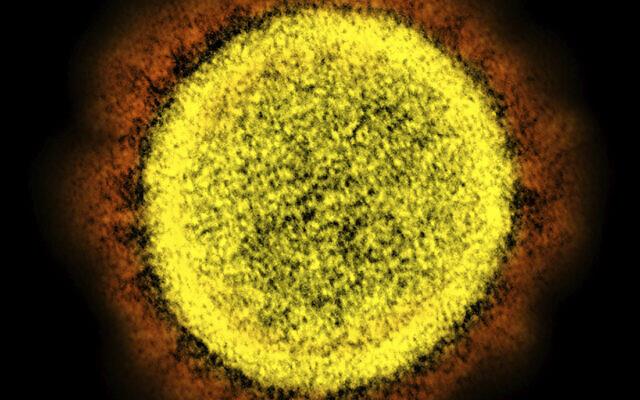In study not yet peer-reviewed, Yale researchers find that coronavirus patients had high levels of autoantibodies that targeted organs and tissue instead of latching onto virus
By TOI STAFF
14 December 2020
This 2020 electron microscope image made available by the National Institute of Allergy and Infectious Diseases shows a Novel Coronavirus SARS-CoV-2 particle isolated from a patient, in a laboratory in Fort Detrick, Maryland. Coronaviruses, including the newest one, are named for the spikes that cover their outer surface like a crown, or corona in Latin. Using those club-shaped spikes, the virus latches on to the outer wall of a human cell, invades it and replicates, creating viruses to hijack more cells. (NIAID/NIH via AP)
The coronavirus causes the body to produce a long-lasting immune response that actually attacks the body instead of the virus, possibly explaining why some patients continue to have a variety of symptoms long after they are clear of infection, scientists have found.
The research has not yet been published or peer-reviewed.
“COVID-19 patients make autoantibodies that actually interfere with immune responses against the virus,” Aaron Ring, an immunobiologist at Yale University and senior author of study, told the Guardian in a report published Sunday.
The result can damage the body, including the brain, blood vessels, and liver, areas that have been seen to suffer in those with symptoms of what has become known as “long COVID” — continued illness, fatigue or breathlessness in those who were infected and then recovered from COVID-19, the disease caused by the coronavirus.
Ring worked with Akiko Iwasaki, a professor of immunobiology at Yale, to monitor COVID-19 patients with various severities of the disease and compared them to health hospital workers, looking for immune system antibodies that work by attacking any of nearly 3,000 proteins.
Whereas normal antibodies latch onto the virus proteins to prevent them from spreading, autoantibodies are the wrong shape and instead attach to proteins that are on human cells, or that have been released by them, the report said.
The study, the scientists wrote, found that COVID-19 patients had “dramatic increases in autoantibody reactivities” compared with hospital workers who did not have the disease.
Though some autoantibodies were apparently present in the patients before they were infected with the virus, others only appeared and increased as the disease took hold. More than five percent of hospitalized patients had damaging autoantibodies. The more autoantibodies there were, the more severe the COVID-19 symptoms.
“We certainly believe that these autoantibodies are harmful to patients with COVID-19,” said Ring, adding that the damaging effects could possibly continue even after the infection itself is no longer causing illness.
“Because antibodies can persist for a long time, it’s conceivable that they may contribute to the development of long COVID diseases,” he said.
“Post-COVID syndromes could plausibly be caused by long-lived autoantibodies that persist well after the virus is cleared from the body,” Ring told the Guardian. “If this is the case, there are immunosuppressive treatments, such as those used for rheumatological diseases, that could be effective.”
Long COVID is believed to affect about 10% of 18- to 49-year-old coronavirus patients, and as much as 20% of those over the age of 70, according to the report.
The scientists believe that more than one type of autoantibody in each patient is causing the trouble.
Researchers are also looking at whether autoantibodies are to blame as well for long-term symptoms in other disease such as Ebola and Chikungunya and in cancer patients after immunotherapy, the report said.
The study comes as countries around the world, including Britain, the US and Israel, are gearing up for or have already started mass immunization programs against the coronavirus.
Since the start of the global pandemic early this year, there have been 70,461,926 cases of infection reported to the World Health Organization, according to figures it published Sunday. There have been 1,599,704 deaths.
SOURCE: timesofisrael.com/long-covi...
LUpus Patients Understanding & Support (LUPUS): lupus-support.org/topic/326...
